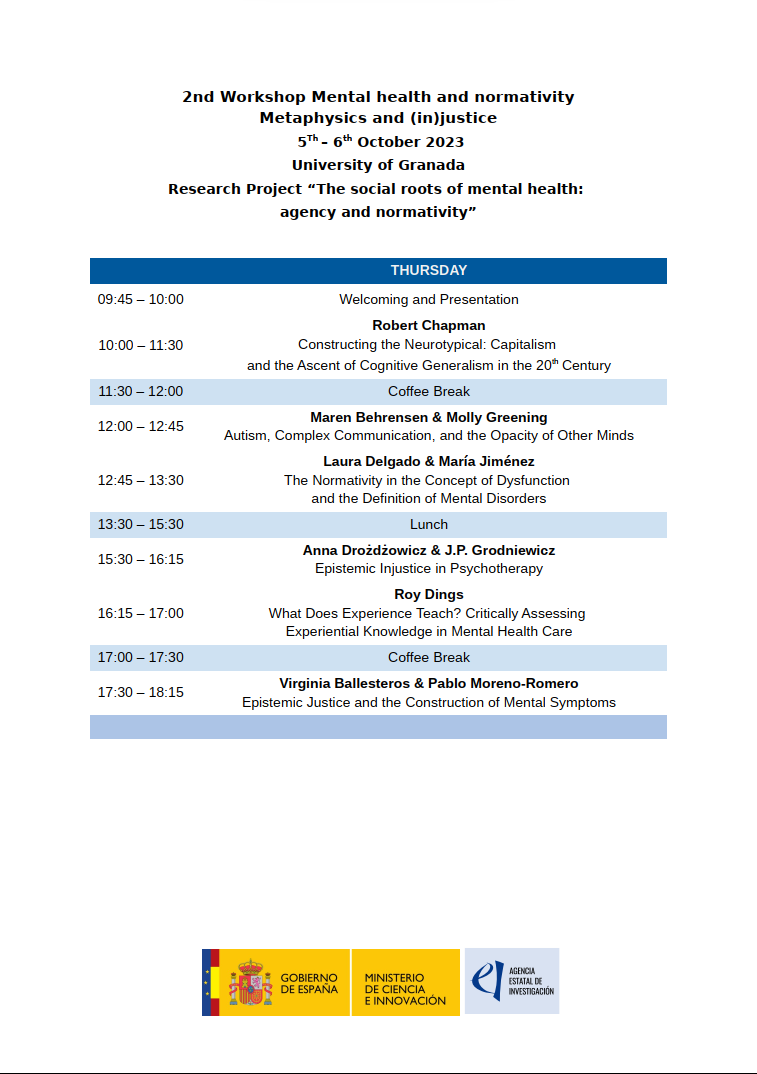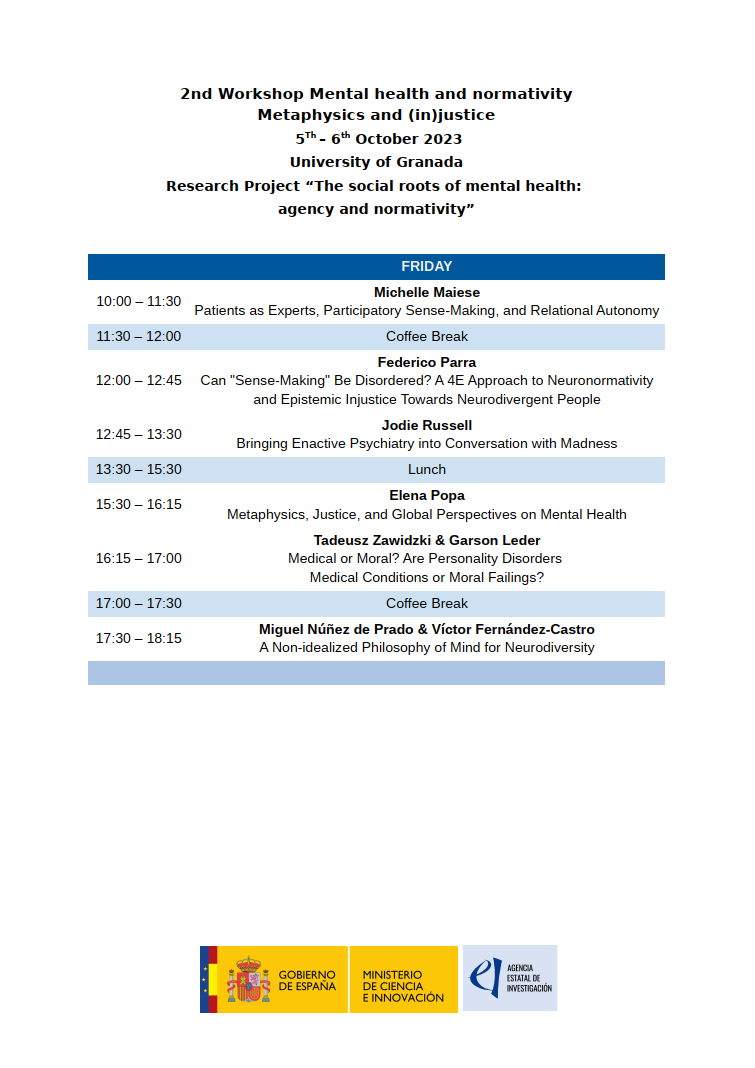Nuestro compañero Víctor Fernández Castro (FiloLab – UGR) organiza junto a Virginia Ballesteros (UV/UGR) y Miguel Núñez de Prado (UU) el Segundo Workshop «Salud mental y normatividad: metafísica e (in) justicia«. El workshop tendrá lugar entre el 5 y 6 de octubre de 2023 en Granada (España). Siguiendo los pasos de la edición previa, este encuentro tiene como objetivo involucrar a investigadoras e investigadores internacionales para un intercambio de nuevas y emocionantes ideas sobre la metafísica de la salud mental y la justicia social en el hermoso enclave del Carmen de la Victoria. Robert Chapman (Sheffield Hallam University) y Michelle Maiese (Emmanuel College Boston) serán los oradores principales del evento. Se espera albergar 0cho presentaciones adicionales.
Las personas interesadas en asistir al workshop, pueden enviar un correo a vfernandezcastro@ugr.es.
2nd Workshop Mental health and normativity: Metaphysics and (in)justice
The main aim of the workshop is to analyze the relationship between metaphysics and social justice in mental healthcare. Debates about the concepts of mental health and disorder have remained a constant throughout the history of the psy-disciplines. The intricate connection between the metaphysics of mental health/disorder and issues concerning social justice for the mad have occupied center stage within these debates. Mental disorders have been characterized in myriad different ways; the list includes “brain disorders”, “problems in living”, “psychological dysfunctions”, “myths”, “behavior problems”, or even “tools for social control”, to name a few. These different conceptualizations and their underlying metaphysics of mind, health, and disorder have a direct impact on questions regarding the role of meaning and agency in mental disorder, the demarcation between psychopathology and diversity, deviancy, and non-normative identity, or the design of ethically-informed mental health practice and policymaking; these, in turn, shape our responses to issues regarding the autonomy and civil rights of mental health-related collectives.
The new wave of criticism against traditional diagnostic manuals during the 2010s and the early 2020s has sparked renewed interest in these issues. Of particular importance is the rise of self-advocacy movements such as neurodiversity, user/survivor, and mad liberation. These have consistently denounced the various kinds of injustices to which these collectives have been and continue to be subjected, including those stemming from both conventional and alternative/critical conceptions of mental health. For example, new ecological perspectives on mental function proposed by neurodiversity advocates have targeted not only traditional psychiatric approaches, but also the larger social structures built around a narrow understanding of what constitutes normal mental functioning. Others have denounced the role of certain metaphysical assumptions commonly associated with psychiatric classifications and the concepts of mental disorder/symptoms in promoting the stigmatization and stereotyping of mental health collectives, which may in turn lead to epistemic injustice and other kinds of unjust and abusive practices. As a final example of the intertwining of metaphysical aspects and social justice, we can take the demarcation between the individual self and psychopathology: different views of the mind and the self give rise to differing perspectives on identity and self-understanding for people from mental health collectives, which in turn has ramifications for key socio-political and ethical issues concerning autonomy and moral or legal responsibility.
These and other issues are the target of the present workshop. Broadly speaking, we expect contributions to address the intertwining of metaphysics and social (in)justice in either of the following two ways: (1) exploring the socio-political implications of available metaphysical conceptions regarding mental health (e.g., metaphysical aspects of personal identity, the concept of mental disorder, etc.); (2) developing or arguing for a particular metaphysical conception on the grounds that it best serves the purposes of promoting justice in mental health (promoting epistemic justice, avoiding stigmatization, promoting political action, etc.). A (non-exhaustive) list of topics includes:
– Conceptions of mental disorder / mental symptoms / therapy / related notions that promote (in)justice / oppression / abuse.
– Conceptions of identity/related concepts that promote (in)justice / oppression / abuse.
– Conceptions of the mind-body-world relationship that promote (in)justice / oppression / abuse (with particular attention to the implications of 4E and other postcognitivist approaches).
– Ameliorative/emancipatory metaphysics drawing from mad/neurodiversity/survivor movements.
We especially encourage contributions that seek to create more just models of mental health. We also encourage submissions from members of minority groups.
Abstracts should be up to 500 words. They must be submitted to healthandnormativity@gmail.com by July 16 (included).
This workshop is organized by the projects “The Social Roots of Mental Health: Agency and Normativity” (PID2021-126826NA-I00) and the grant IJC2019-040199-I (Juan de la Cierva Incorporación) funded by the Spanish Ministry of Science and Innovation.
A continuación compartimos el programa del workshop.


